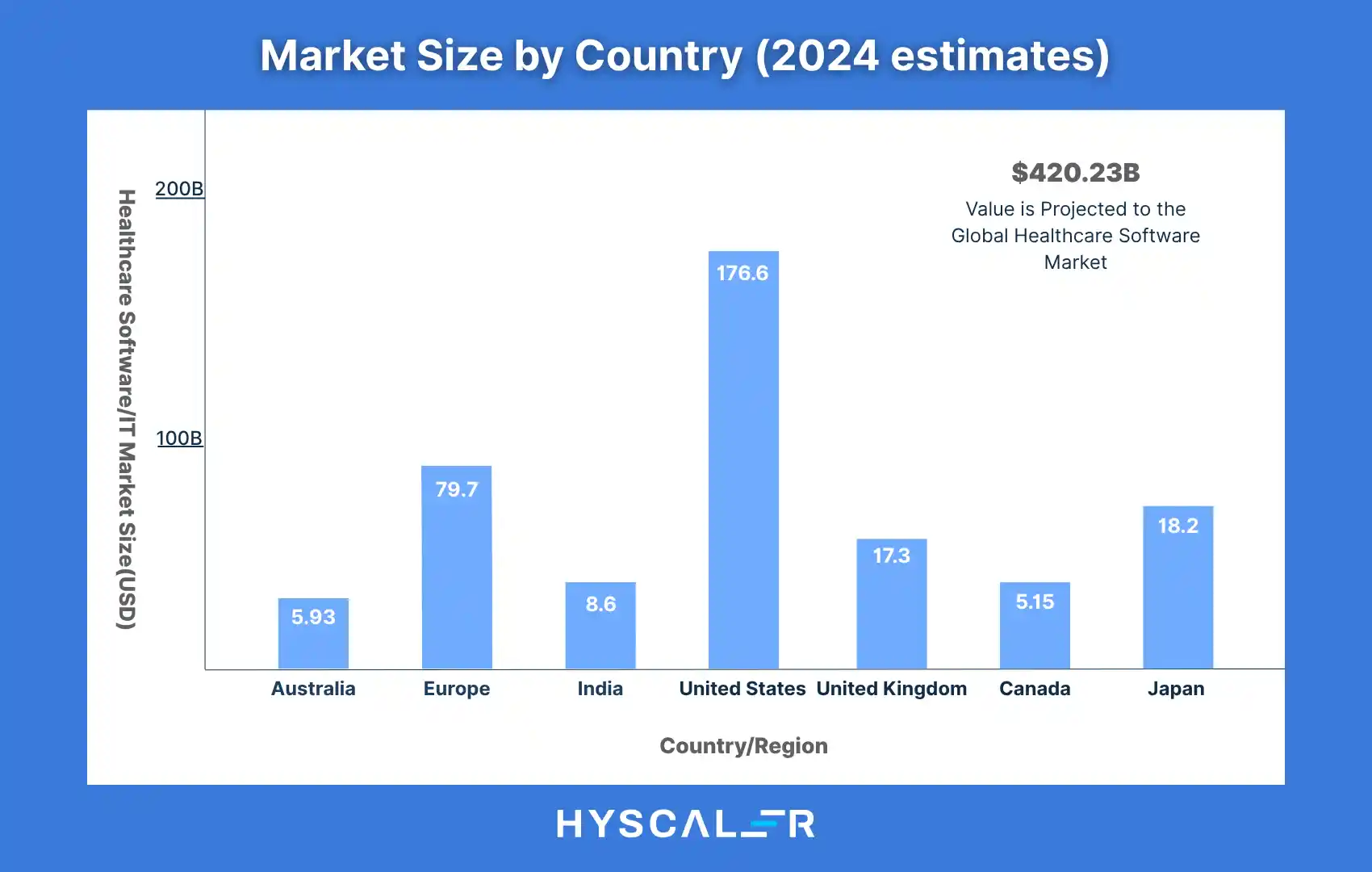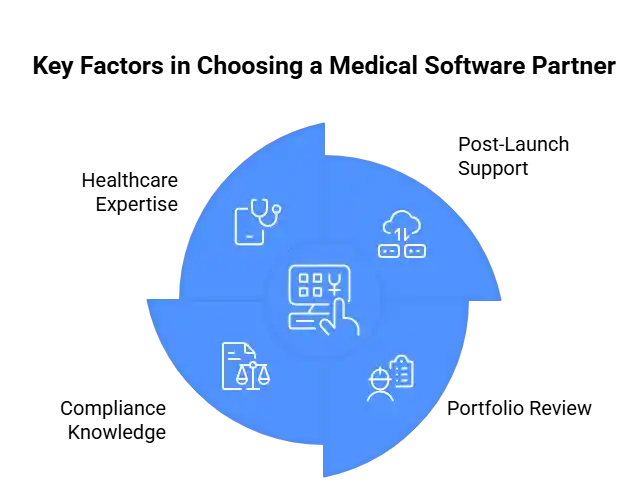Table of Contents
How can healthcare providers improve patient care and cut costs in today’s digital world?
The answer is custom medical software. It is changing how healthcare works worldwide.
The data speaks for itself healthcare IT reached a value of $663 billion in 2023.. It may grow to $1,834 billion by 2030, with a fast growth rate of 15.8%. This shows the strong need for new solutions.
Custom medical software development is made for the specific needs of each healthcare group. It works better than general tools because it fits special tasks, follows health rules, and improves care. Tools like electronic health records, telemedicine, and patient apps are now driving big changes in healthcare software product development.

What Is Custom Medical Software Development?
Custom medical software development means building digital tools for healthcare needs. These tools include EHRs, telemedicine apps, patient portals, and systems that help doctors make better decisions.
Unlike generic software, custom-built solutions are tailored and offer greater value.
- HIPAA Compliance: Built-in security measures ensure patient data protection
- Interoperability: Seamless integration with existing healthcare systems
- Scalability: Grows with organizational needs and patient volume
- Personalized Workflows: Matches specific clinical processes and procedures
Studies show that healthcare groups using custom software are 40% more efficient than those using generic tools. The healthcare software-as-a-service (SaaS) market is also growing fast. Forecasts show the market will jump from $36.8 billion in 2024 to $93.4 billion by 2033 due to rising digital healthcare adoption.
Why Is Custom Software Essential for Healthcare Innovation?
Modern healthcare faces many challenges that generic software cannot fix. Healthcare software product development provides targeted solutions for these key issues:
- Enhanced Patient Care: Real-time access to patient data helps doctors make faster decisions and improve treatment results.
- Regulatory Compliance: Built-in tools ensure the software meets HIPAA, GDPR, and other health rules without extra work.
- Data Integration: Custom systems connect different tools to create one patient record, making care easier to manage.
- Workflow Optimization: Custom designs match clinical tasks, lowering admin work and reducing mistakes.
Research shows that custom software can reduce administrative errors by 30% and improve efficiency.
Many healthcare groups also report better staff productivity and higher patient satisfaction. In fact, about 90% of healthcare leaders say virtual and connected care will be key to their plans by 2025 making custom software more important than ever.
How Does Custom Medical Software Development Improve Patient Outcomes?
Custom medical software development directly impacts patient care in several key ways:
- Faster Diagnoses: AI-driven diagnostic tools and clinical decision support systems speed up accurate diagnosis
- Improved Patient Engagement: Patient portals and mobile applications enhance communication and treatment adherence
- Predictive Analytics: Advanced data analysis identifies at-risk patients and enables proactive interventions
- Telemedicine Integration: Remote care capabilities expand access to healthcare services
A recent case study showed how a hospital cut patient wait times by 20% using custom software for scheduling and workflow. The platform combined appointment booking, resource use, and staff coordination, making the patient experience smoother and improving efficiency.
As illustrated in the chart above, the traditional healthcare software/IT market is projected to reach $420.23 billion globally in 2024, with the United States ($176.6B) and Europe ($79.7B) leading the market.
With a strong CAGR of 38.62%, AI healthcare software is set to close the gap and reach $187.69 billion by 2030.

What Are the Key Benefits of Healthcare Software Product Development?
Healthcare software product development offers many benefits for medical organizations:
- Cost Efficiency: While upfront costs may be higher, custom tools lower long-term expenses by boosting efficiency and cutting manual work.
- Scalability: These systems can grow with your organization, handling more patients and new services without major changes.
- Compliance: Built-in features help meet healthcare rules and keep your organization compliant.
- Integration: Custom software works well with current EHRs and medical devices, cutting down manual data entry and improving accuracy.
Key Takeaways:
- Reduced operational costs through automation (projected 25-40% cost savings by 2030)
- Enhanced data security and patient privacy protection
- Improved staff productivity and job satisfaction
- Better patient outcomes through coordinated care
- The healthcare IT market is forecasted to hit $834.35 billion by 2029
How to Choose the Right Custom Medical Software Development Partner?

Choosing the right development partner is key to a successful project.
Consider these key criteria:
- Healthcare Expertise: Verify their experience in medical software development and familiarity with healthcare workflows
- Compliance Knowledge: Ensure expertise in HIPAA, GDPR, and other relevant healthcare regulations
- Portfolio Review: Examine previous projects and client testimonials from healthcare organizations
- Post-Launch Support: Confirm availability of ongoing maintenance and technical support services
Look for partners with proven track records in developing HIPAA-compliant software and demonstrated experience in healthcare IT implementations.
What Are Common Challenges in Healthcare Software Development?
Building healthcare software presents unique obstacles that demand expert understanding:
Regulatory Compliance: Healthcare rules are complex and always changing. Teams must fully understand these laws to stay compliant.
Data Security: Keeping patient data safe requires strong encryption, secure systems, and strict access controls.
Legacy System Integration: New software must often work with old systems. This needs careful planning and smart data transfers.
The best solutions include agile development, thorough testing, and skilled healthcare IT teams. Studies show that 70% of healthcare software projects struggle with system integration. That’s why choosing the right partner is key.
Still, the outlook is strong. Over half of healthcare providers now use or develop custom software for patient care, condition tracking, and medication management. By 2030, the healthcare software product development market is projected to hit $104.1 billion.
Conclusion
Custom medical software development is playing a key role in shaping the future of healthcare. It offers solutions designed to improve patient care and lower costs. With custom healthcare software, medical groups can solve unique problems, meet health rules, and run more efficient care systems.
The benefits are clear from better patient engagement to smoother clinical work. That’s why smart healthcare groups see custom software as a key investment. As healthcare keeps changing, custom tools will become even more important for delivering quality, fast, and patient-focused care.
Ready to transform your healthcare operations? Explore comprehensive healthcare software development solutions to discover how custom medical software can drive innovation in your organization. Share your thoughts on healthcare software development in the comments below!
FAQ
What are the key compliance requirements for healthcare software?
Healthcare software must comply with various regulations including HIPAA (Health Insurance Portability and Accountability Act), GDPR (General Data Protection Regulation), and other healthcare-specific rules. Custom software can be built with compliance features integrated from the ground up, ensuring patient data protection and regulatory adherence without additional modifications.
How long does it typically take to develop custom medical software?
While the article doesn’t specify exact timelines, development duration depends on project complexity, features required, integration needs with legacy systems, and compliance requirements. The process involves careful planning, agile development methodologies, thorough testing, and often complex data migrations from existing systems.
What types of custom medical software can be developed?
Common types include Electronic Health Records (EHRs), telemedicine applications, patient portals, clinical decision support systems, practice management software, medical billing systems, diagnostic tools with AI integration, and mobile health applications. Each can be customized to match specific organizational workflows and requirements.
How much does custom medical software development cost and what are the long-term savings?
While custom software requires higher upfront investment, it delivers significant long-term cost savings through automation and improved efficiency. The article projects 25-40% cost savings by 2030 through reduced operational costs, elimination of manual work, and streamlined workflows. The exact cost varies based on complexity, features, and organizational requirements.